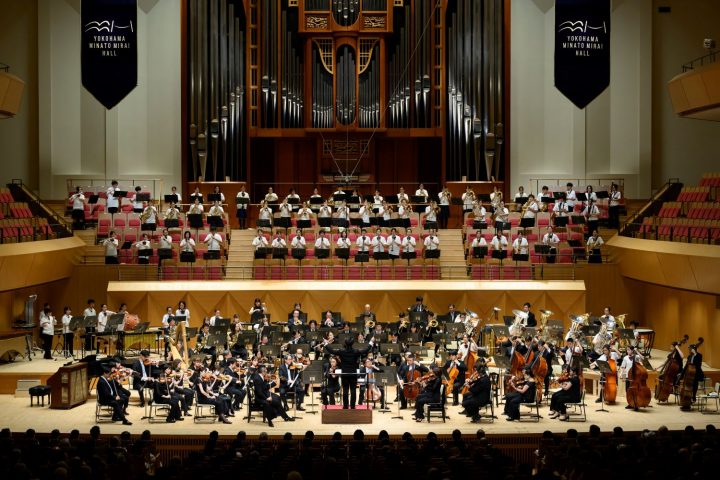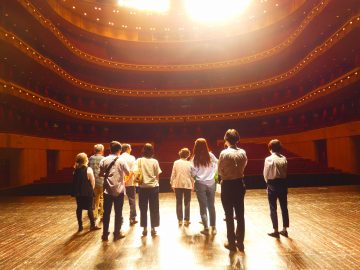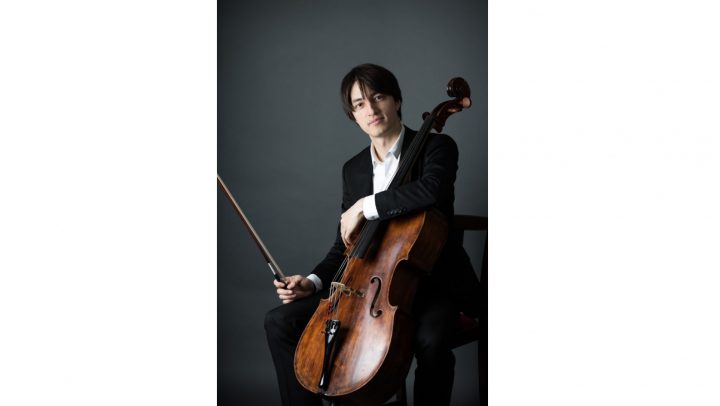This is how orchestral music is created. Check out the power of the Kanagawa Philharmonic Orchestra and the staff that support the music!
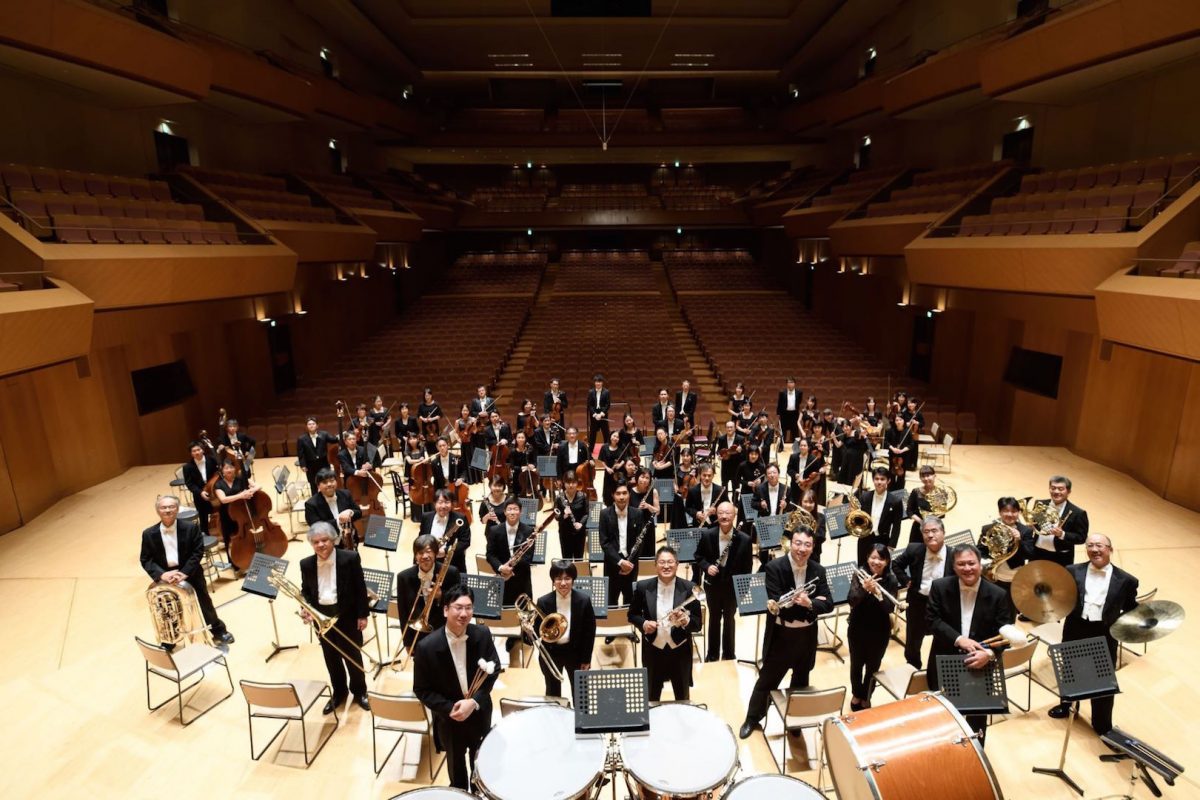
In response to requests for self-restraint amid the COVID-19 pandemic, the Kanagawa Philharmonic Orchestra (hereinafter referred to as Kanagawa Philharmonic) has been forced to cancel regular concerts and other events. Many people have felt lonely without being able to experience live music.
But don't worry, the Kanagawa Philharmonic and music are doing well!
Concerts are gradually being resumed after the effectiveness of infection prevention measures has been verified and prevention guidelines have been established. Seeing the various efforts being made to resume, many people may have been reminded that "orchestral music is supported by the efforts of many people..."
So this time, we visited the Kanagawa Philharmonic's rehearsal venue and interviewed the staff who support the orchestra's wonderful sound.
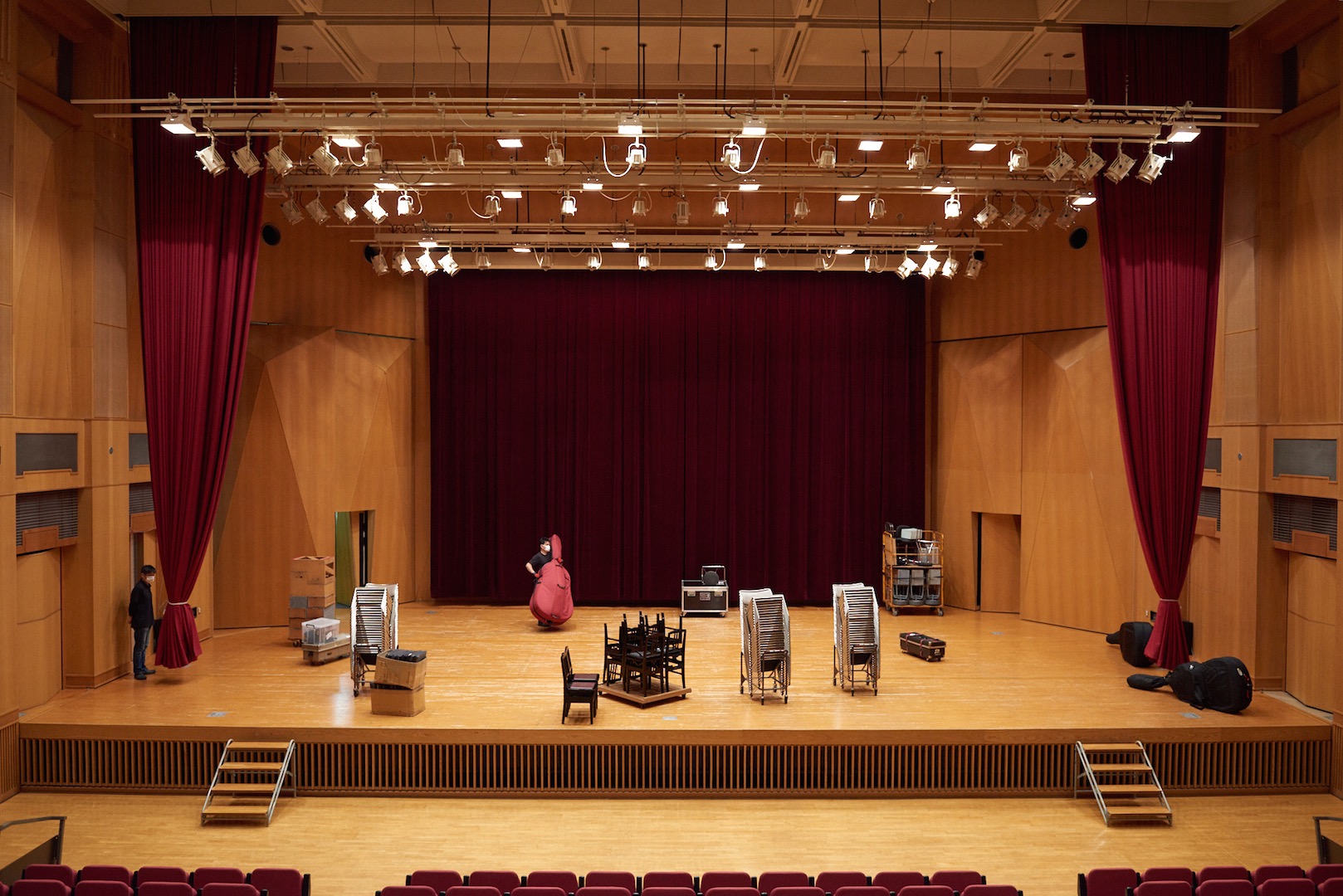
We visited Kanagawa Art Hall in the Prefectural Hodogaya Park. On the day we visited, rehearsals were taking place for the regular concert, which had resumed with some changes to the performers and program.
First, we started by setting up the stage to accommodate the orchestra's lineup. The hall was designed to be used for a wide range of purposes, including music, theater, and dance practice and performances, and the stage can be divided into three sections, each of which can be adjusted to four different heights, making setup very smooth.
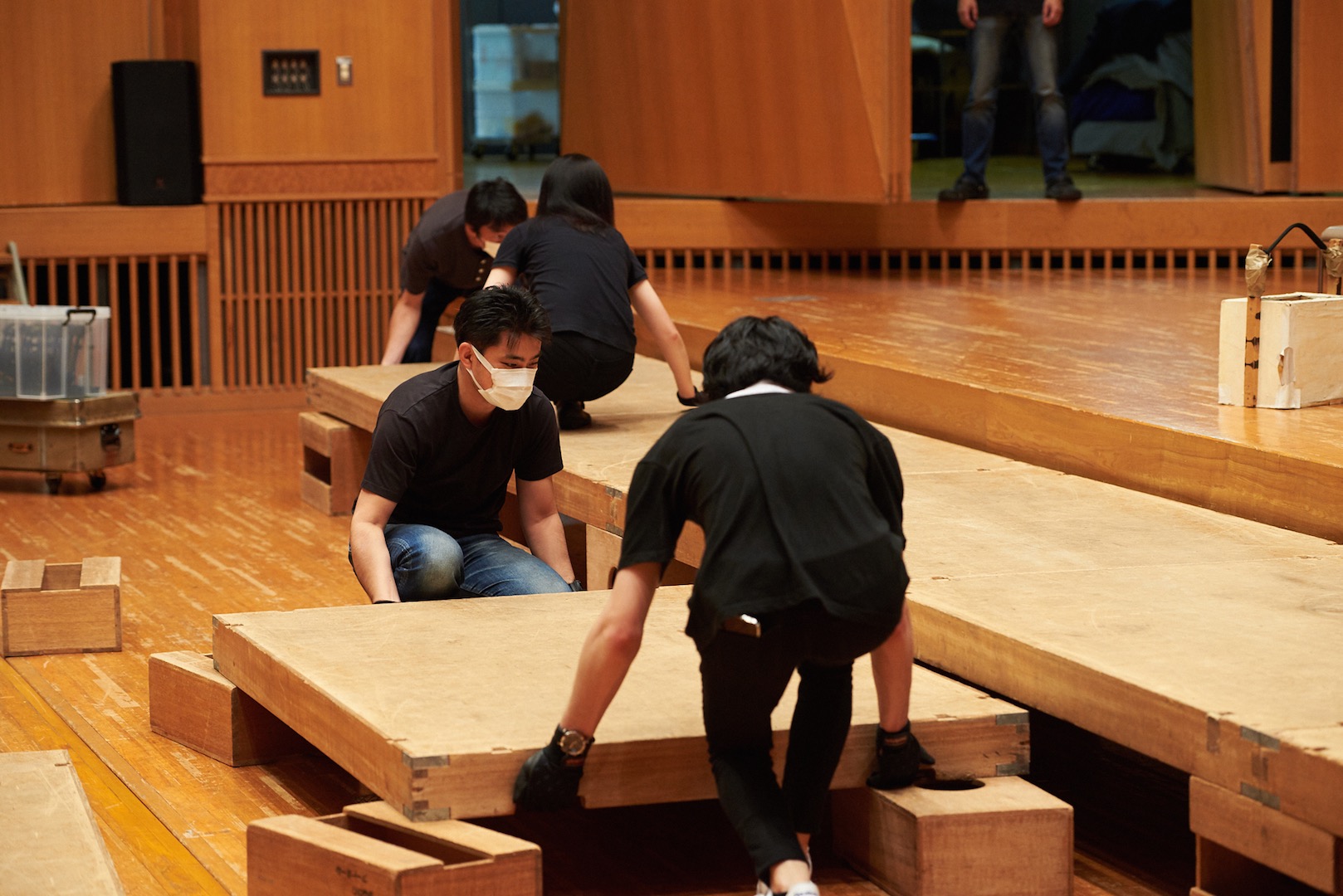
The stage setup affects the sound of the orchestra, so the chairs are carefully arranged. Especially now, as a measure against COVID-19, the distance between players is set wider, so the setup is done carefully while measuring with a scale.
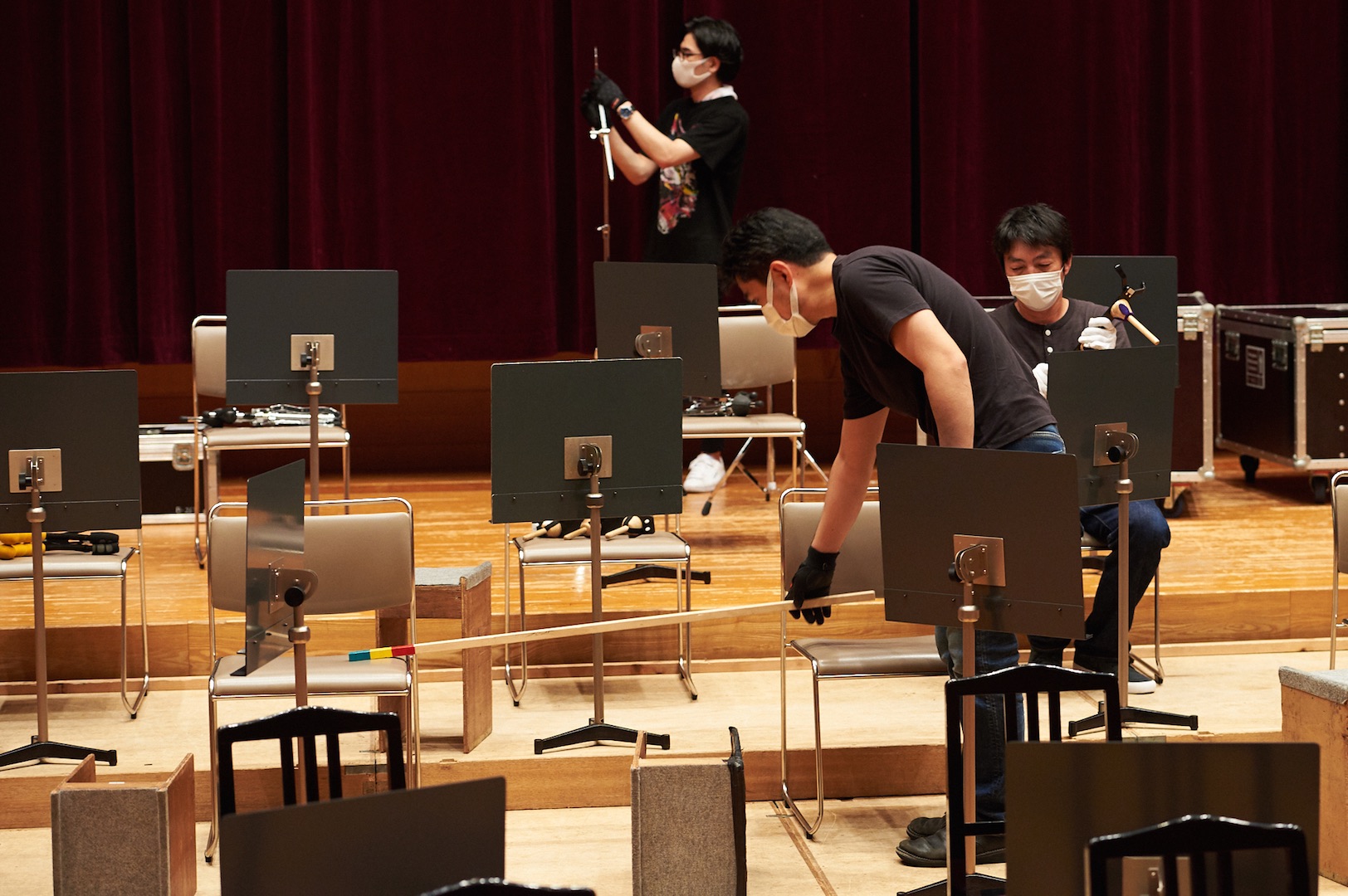
Each player has different preferences for the height and angle of their music stands, so they are carefully adjusted one by one. It's amazing that the staff knows almost every member's preferences!
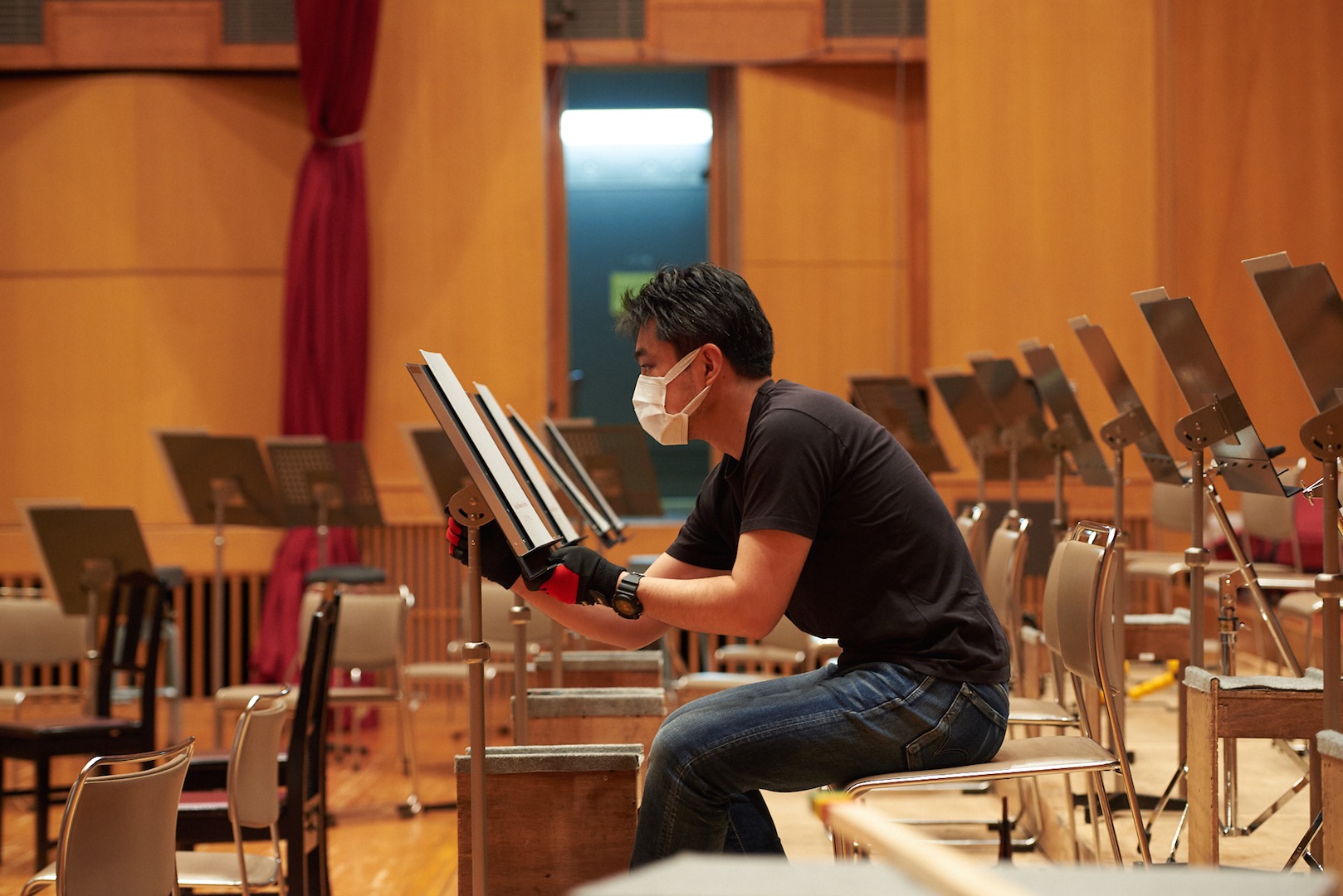
The rehearsal setup was completed, using the entire hall, even to the front of the auditorium. Even though they were working in a familiar art hall, it was impressive that they were able to set everything up in under an hour.
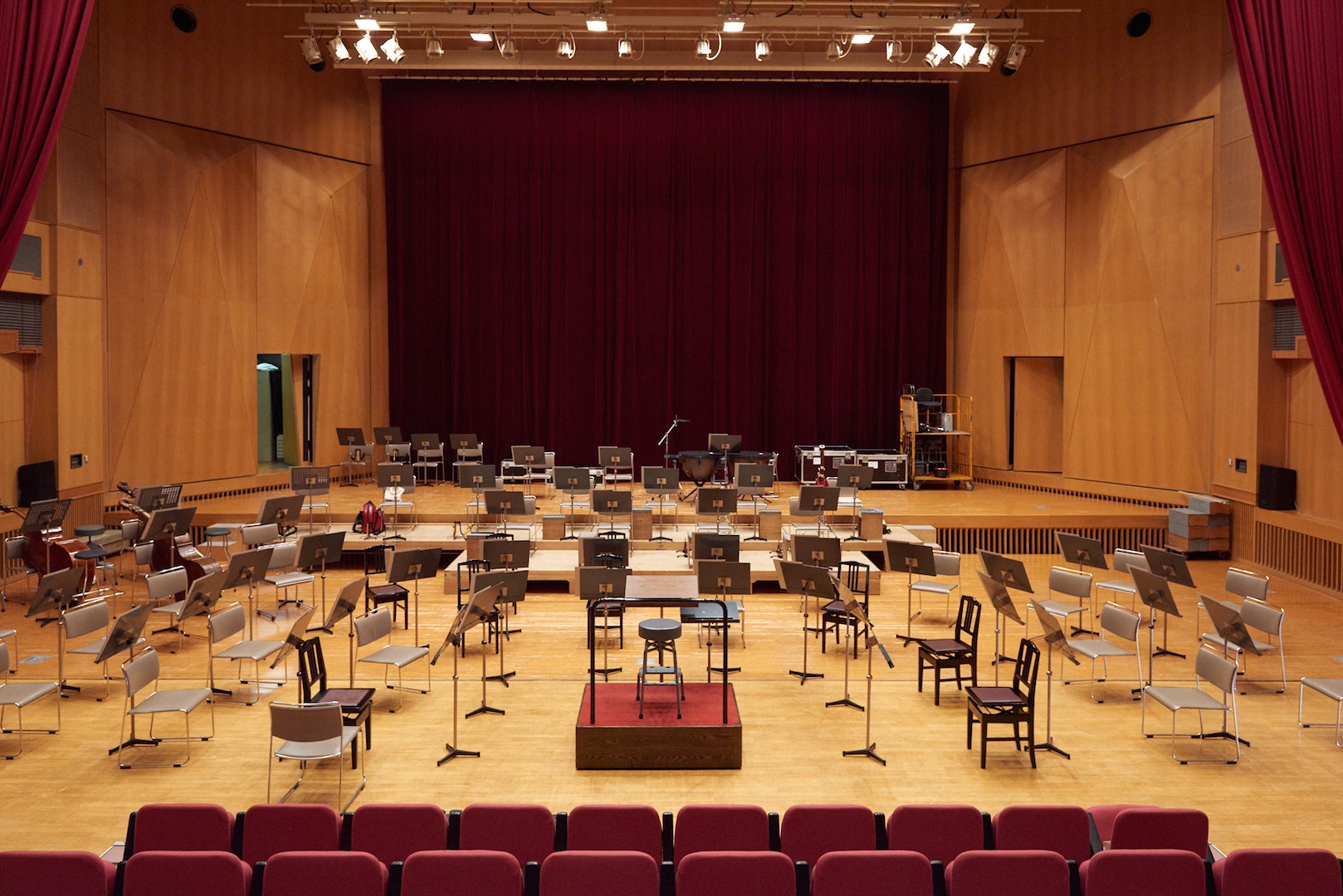
Apparently setting up a stage like this is the job of a "stage manager," but who exactly is that?
We spoke with Atsuyuki Terakado , stage manager at the Kanagawa Philharmonic Orchestra.
What is a stage manager's job?
In a word, it is "everything other than the performance on stage." The specific duties are wide-ranging, as the job is to create an environment in which the players can concentrate on playing without stress during concerts.
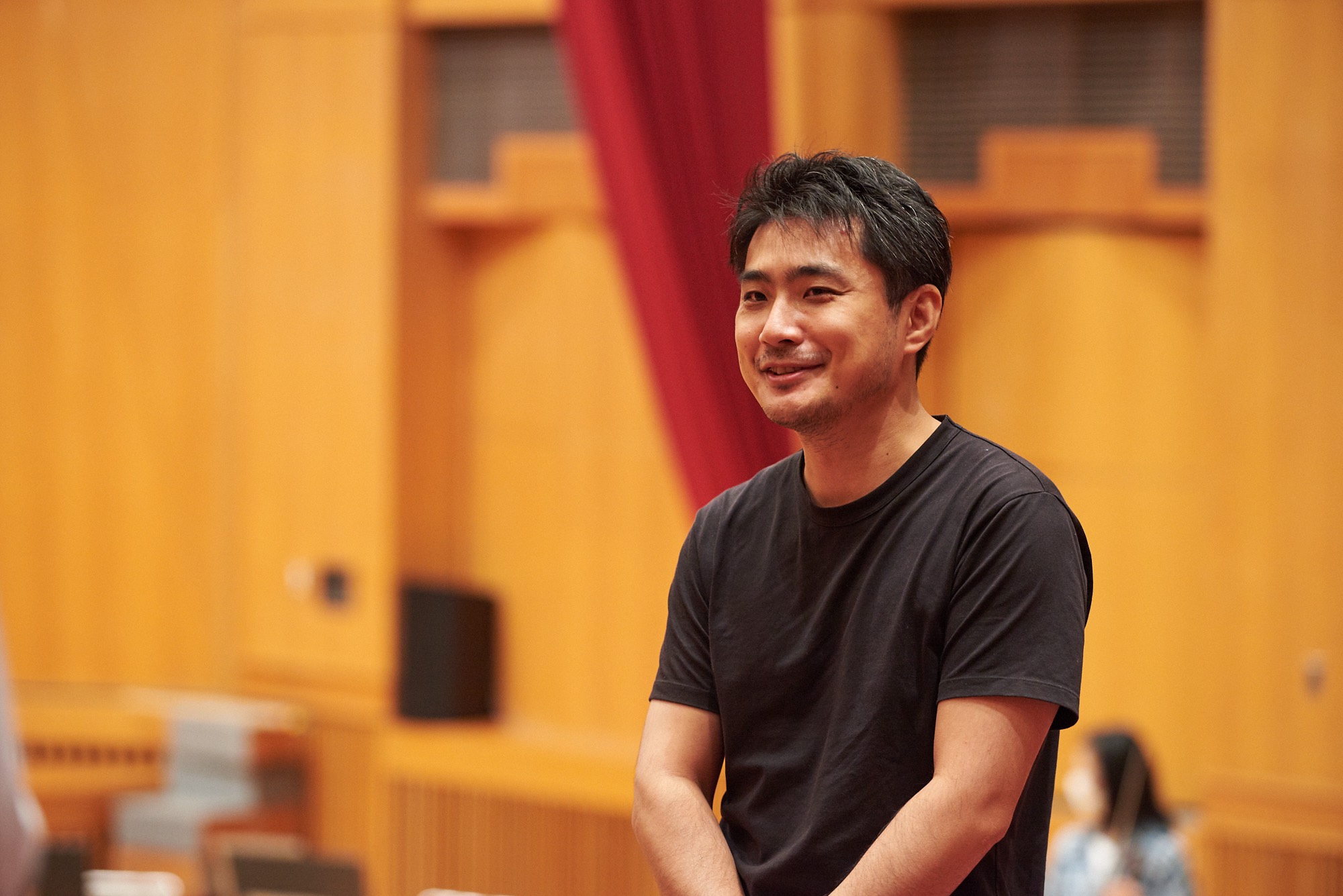
First, once the concert program is decided, we check the instrument lineup and consider the arrangement of the instruments and the arrangement on stage. When performing classical music at the Kanagawa Philharmonic's home premises like today, the flow is almost set, but when performing at a venue for the first time, we need to draw a layout plan while meeting with the person in charge and decide one by one about the transportation of instruments and equipment. If an instrument that the Kanagawa Philharmonic does not have is needed, it will be arranged by rental, but in contemporary music, sometimes "instruments" that make you wonder "What is this?" appear, which can be a headache (laughs).
If the lineup changes for each song, we check the movement of instruments and chairs during rehearsals and decide on the procedure to ensure smooth and safe performance. Furthermore, we have to respond quickly if something happens (such as an earthquake!), so we can't take our eyes off the stage during the show.
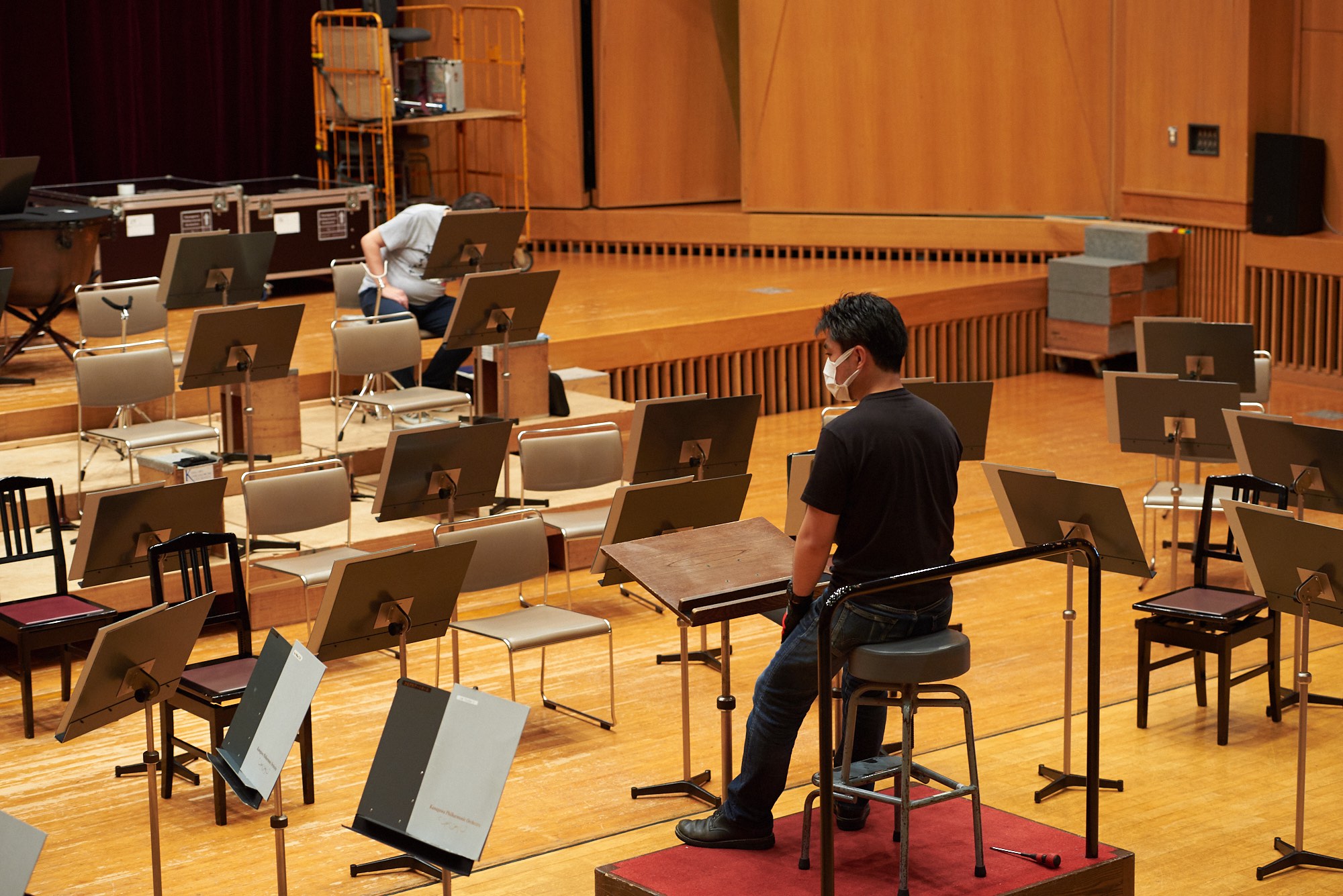
Does the stage setting change a lot?
Of course, the instrument arrangement differs depending on the song, but even for the same song, the arrangement changes depending on the size of the venue and the conductor, so it is necessary to have a proper meeting, especially when meeting for the first time. Sometimes we adjust the balance between resonance and ease of listening to create the best possible condition for the performance, and sometimes we decide the overall arrangement in response to a soloist's request to specify a position where they want to play. Being able to feel the change in sound due to such settings may be the fun part of this job.
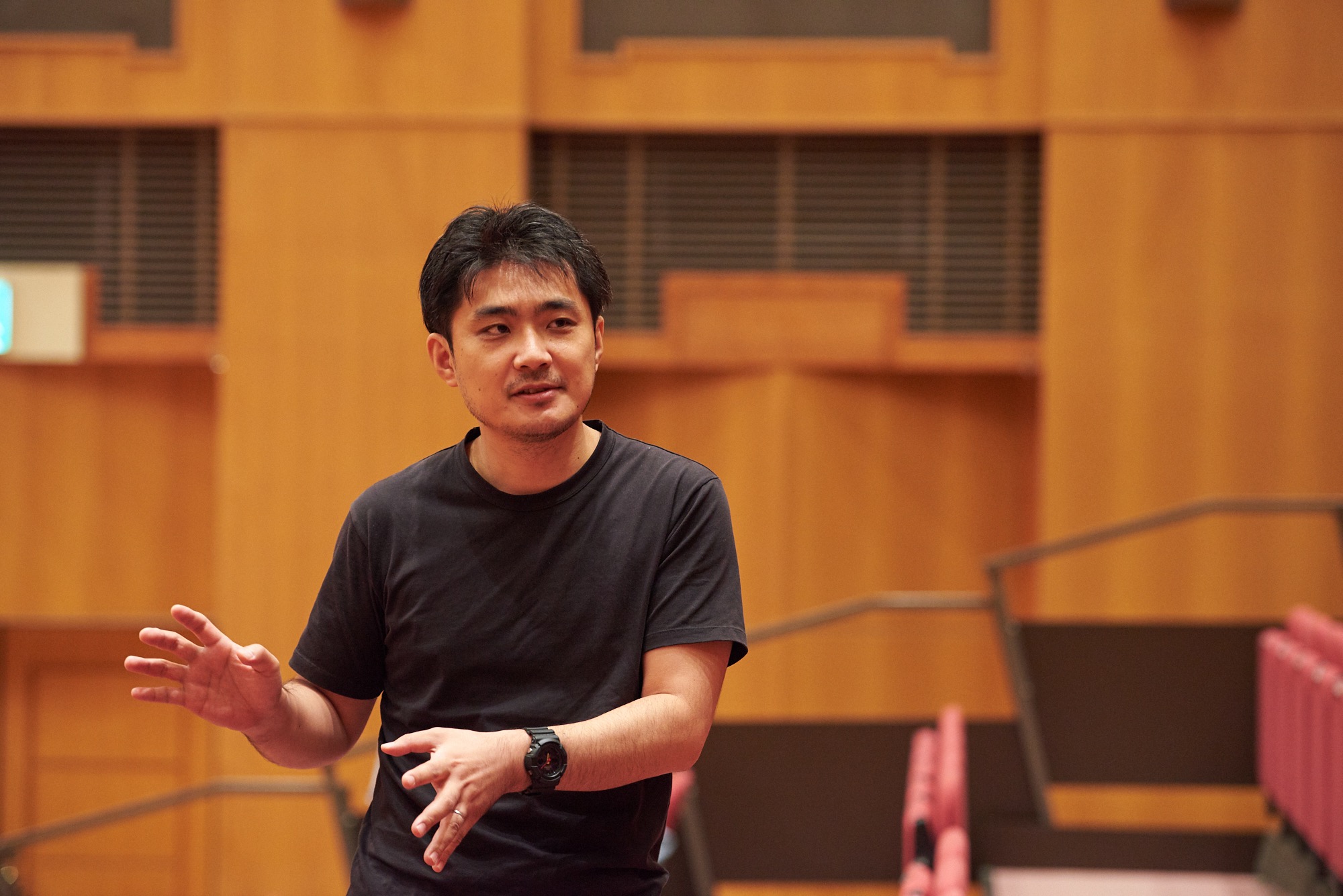
What does Terakado think is the "charm of the Kanagawa Philharmonic Orchestra"?
I have been working with the Kanagawa Philharmonic Orchestra for about 20 years, and I feel that it is an organization where the members can move forward together toward music. They perform not only in concert halls, but also in commercial facilities and outdoor spaces, and their repertoire is wide-ranging, from classical to contemporary music, opera, and pop. Gaining various experiences is not a matter of "good or bad" or "growth," but rather it expands the appeal of the orchestra.
Due to the current COVID-19 pandemic, we haven't been able to listen to live music for about six months, so I was really happy when I heard live music for the first time in a while.
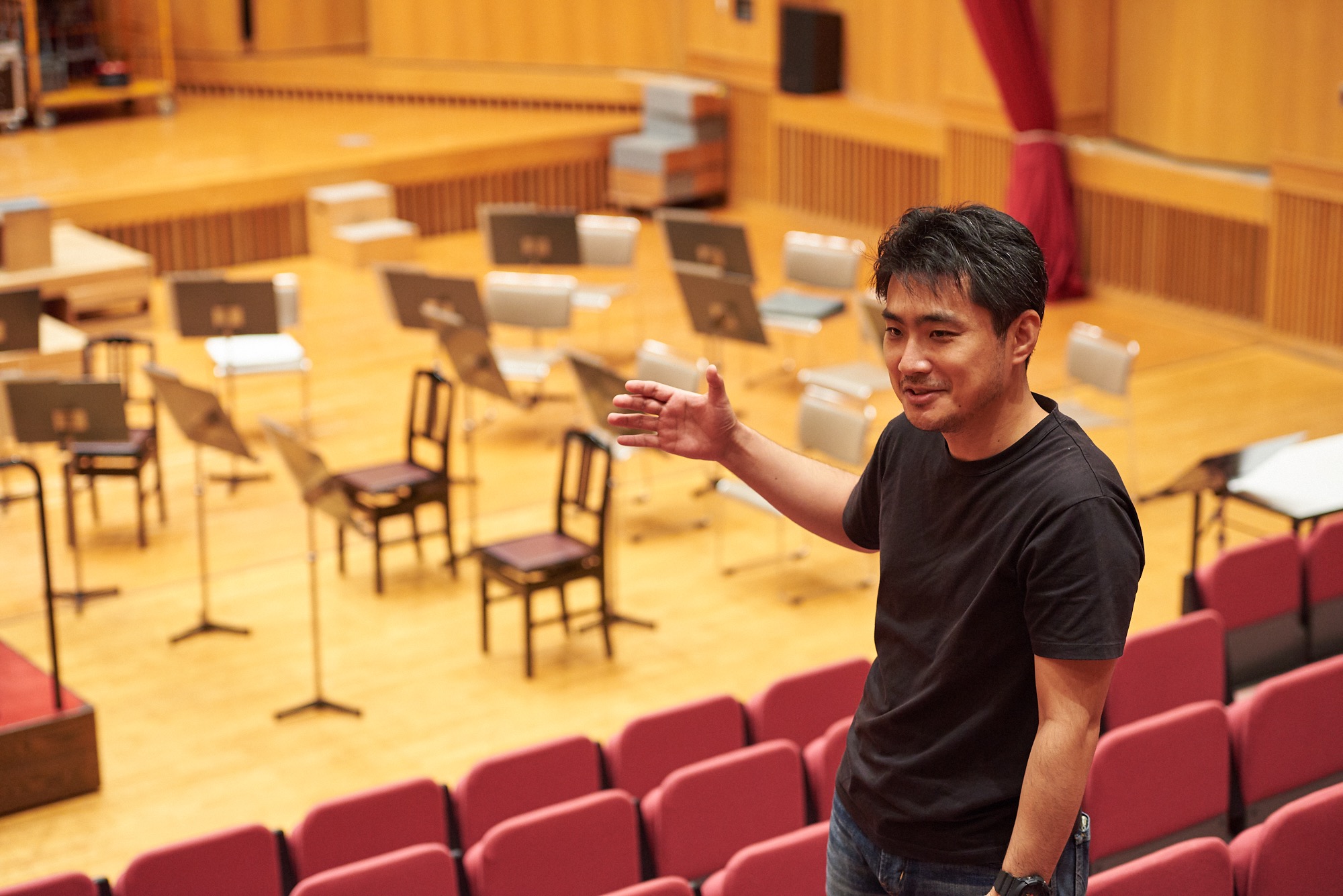
And finally, the rehearsal begins.
The performance stops every few bars and the maestro gives various instructions. Even if it is a famous piece that has been played many times, the interpretation and tempo will be slightly different depending on the conductor. It is impressive that the maestro takes on classical music with a new interpretation, but the members of the Kanagawa Philharmonic Orchestra who quickly respond to the challenge are also wonderful!
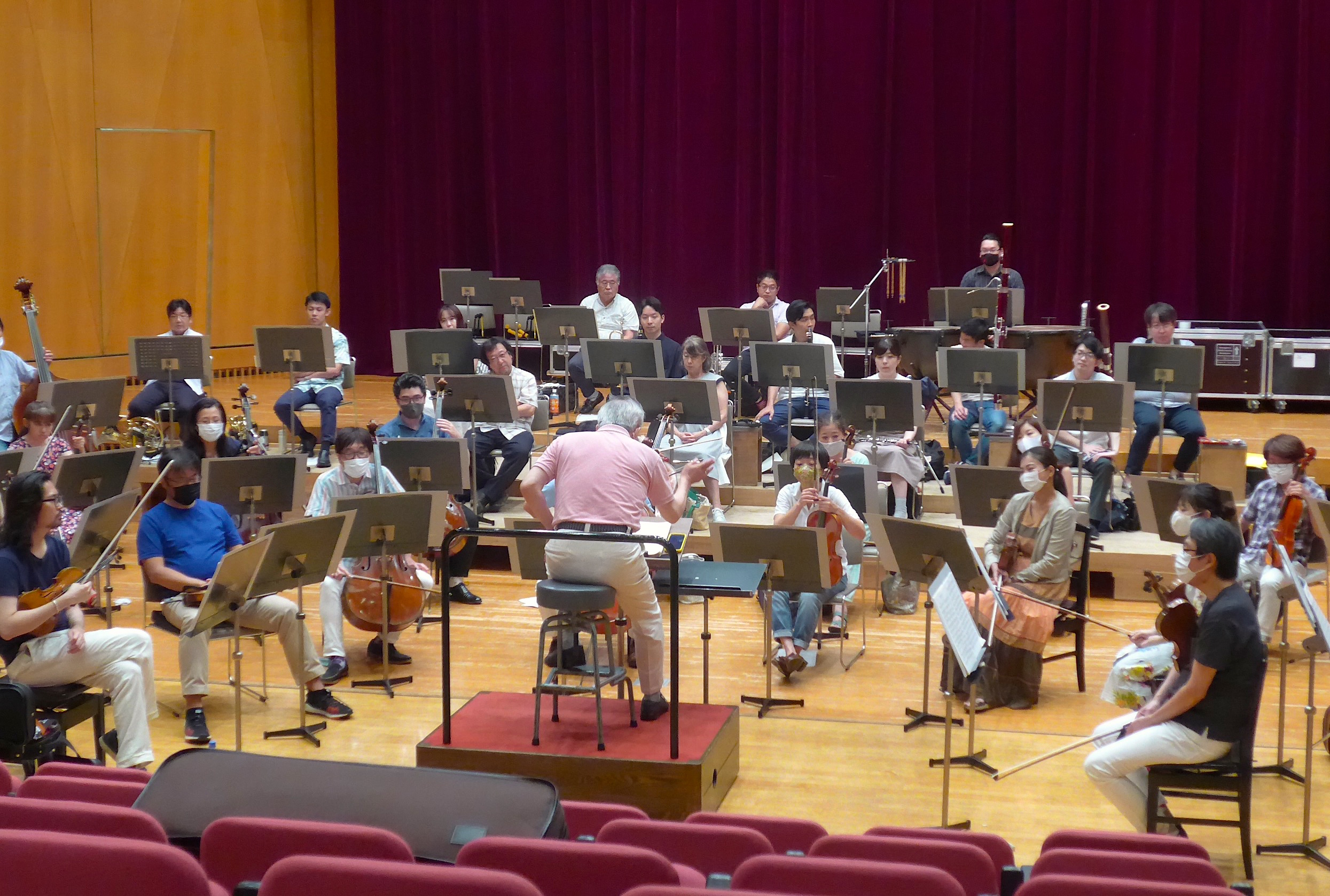
Suddenly, I noticed the players writing something on the sheet music.
Since there are many different instruments in an orchestra, you can imagine that there are many different scores. If each person were to write on the scores one by one, it would become somewhat complicated. Who prepares and manages the scores for an orchestra in the first place?
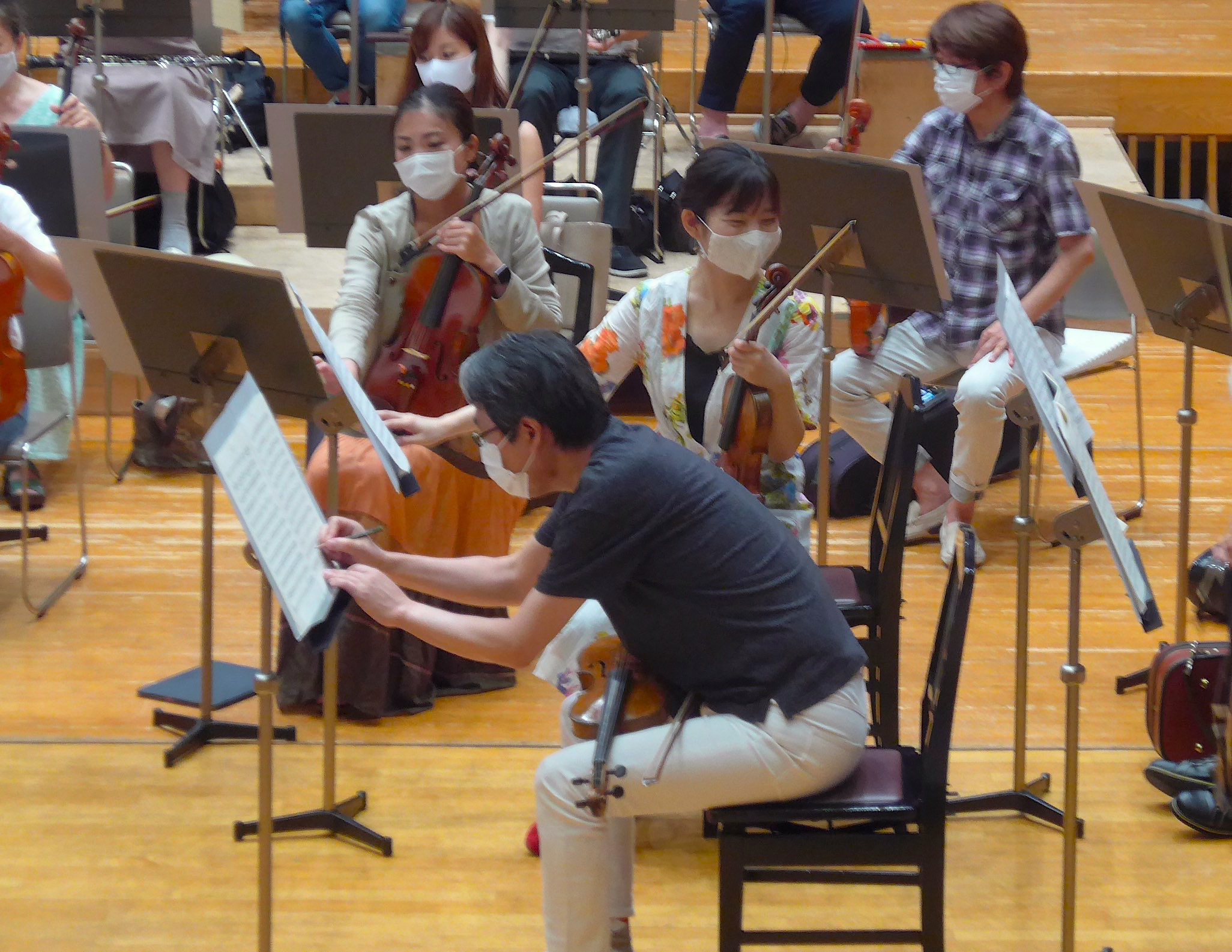
The person who answered these simple questions was librarian Tamae Yamaji.

What is a librarian's job?
Roughly speaking, it is the "preparation" and "management" of sheet music.
First, once the performance program is decided, the sheet music is arranged. However, since the same piece may have slightly different nuances depending on the publisher, it is important to check with the conductor which edition you want to use. If the specified sheet music is not in the Kanagawa Philharmonic's library, it may be necessary to purchase it or rent it due to copyright issues.
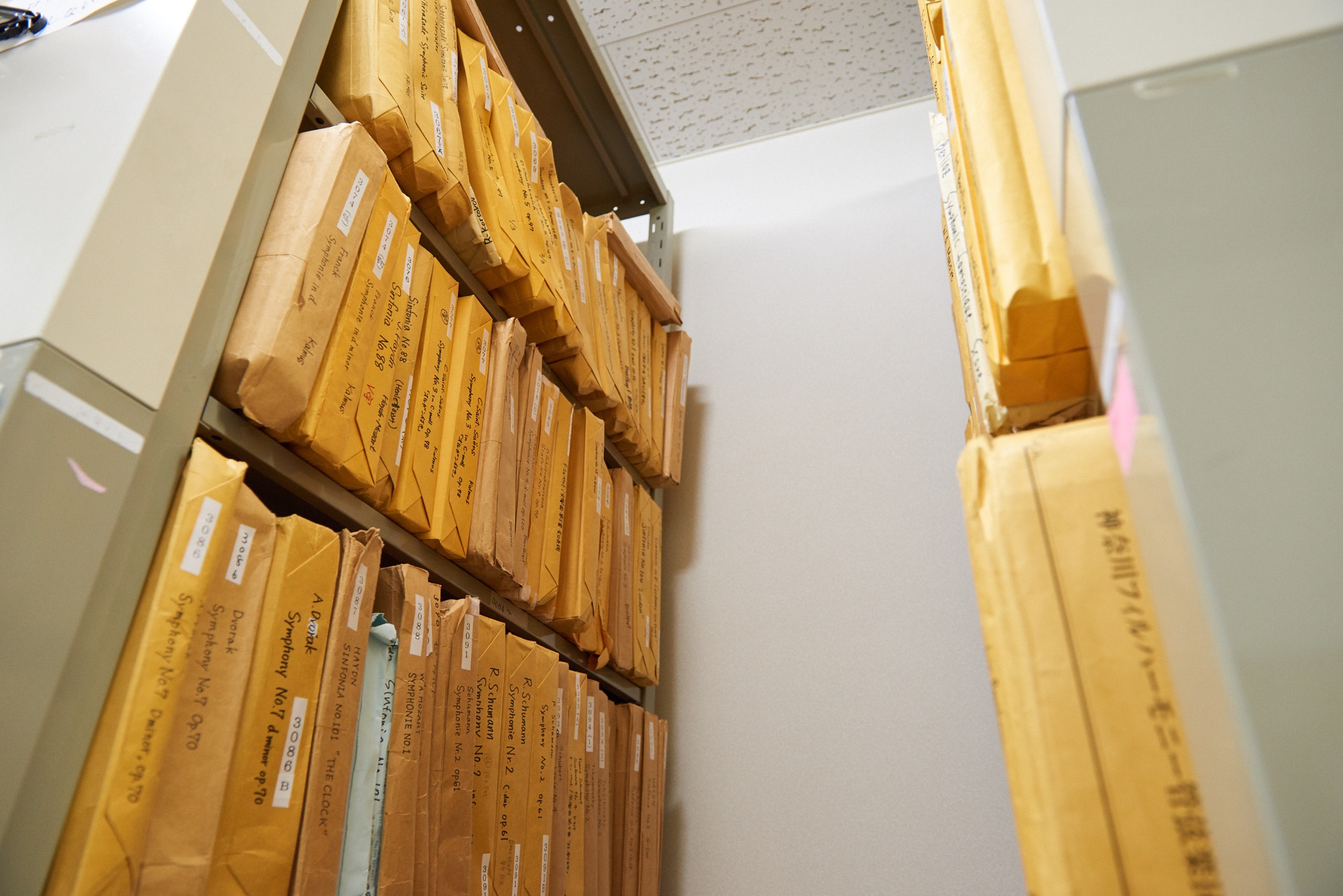
It seems like a lot of players write things on their sheet music, is that okay?
Even if it's the same piece, it's impossible to play it exactly the same every time, so it's normal for players to take notes of the conductor's instructions during rehearsals. The ups and downs of bowing (bow technique) may be checked with the conductor before the rehearsal and written down by the librarian. Each player writes down the conductor's instructions on this, and music unique to that orchestra is created.
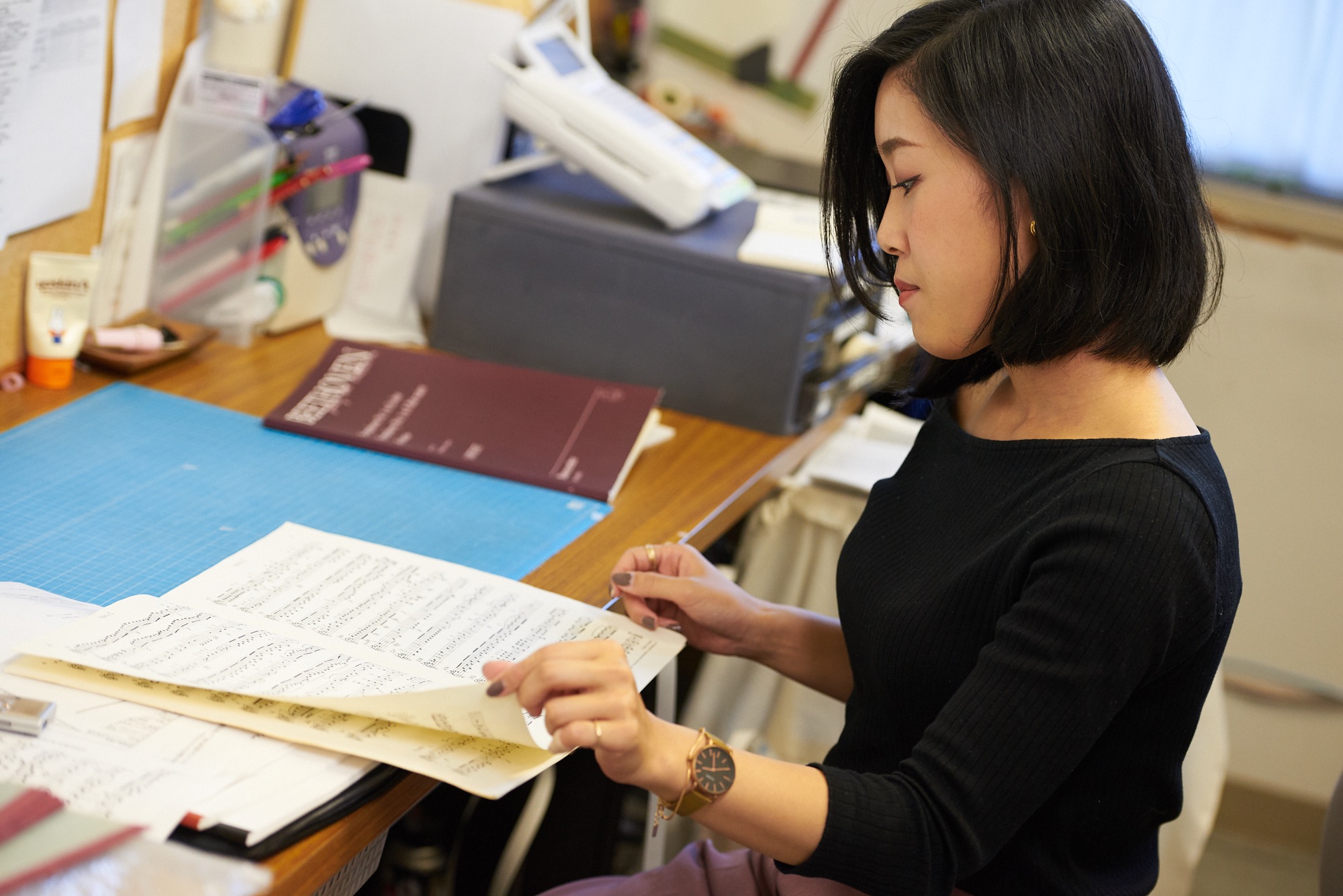
What made you choose to become a librarian?
I had an orchestra class at the music college, and I was impressed that the sheet music was prepared in advance. I learned about the job of a librarian, who supports a glamorous orchestra behind the scenes, and I thought, "That's so cool!"
How do you feel when you actually experience it?
It was a much harder job than I thought it would be (laughs). When preparing scores for a concert, I sometimes repair worn scores and paste pages together to make them easier for players to play. It requires specialized musical knowledge, but it's also important to be considerate and anticipate what the players want.
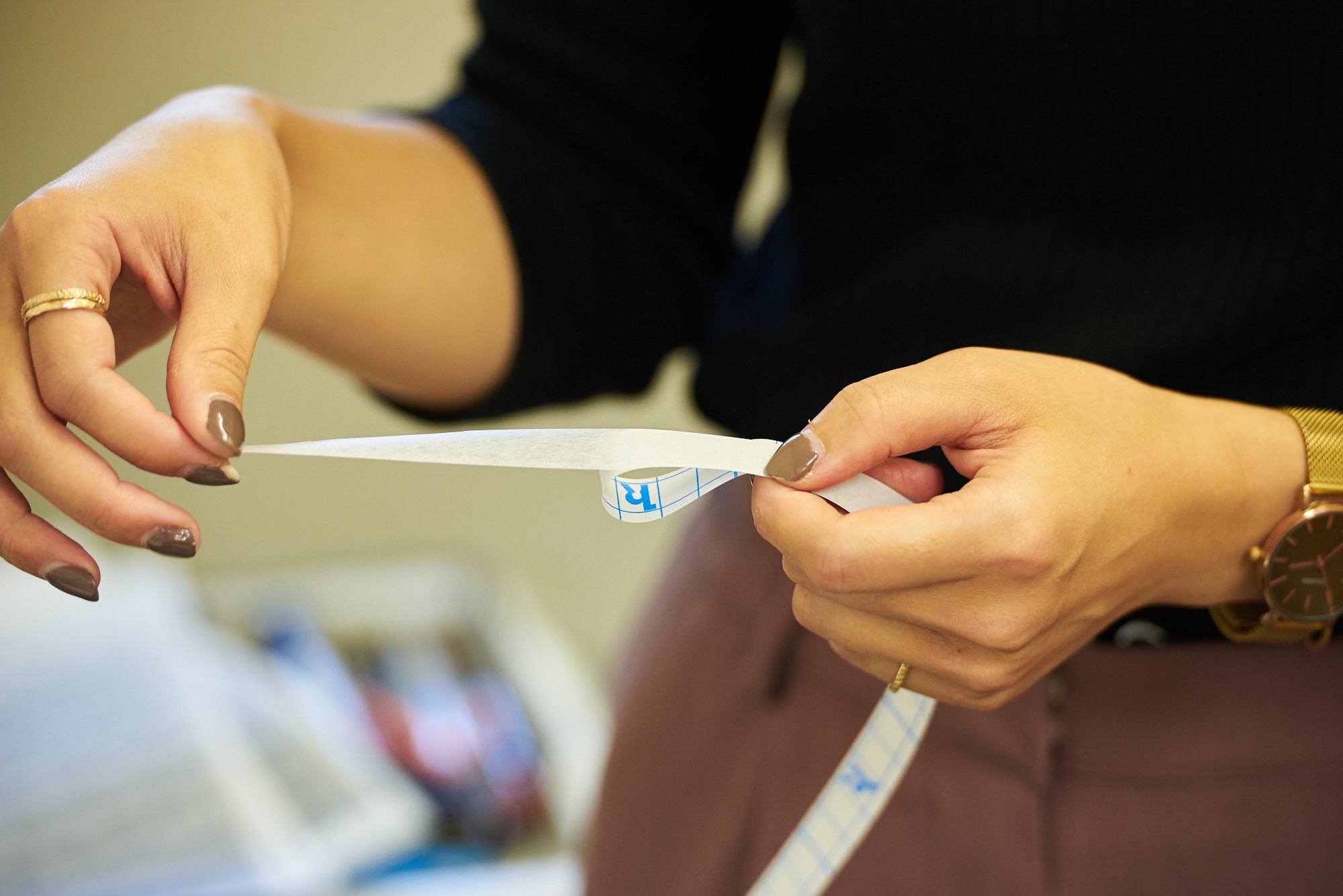
By the way, this is the tape used for repairs and pasting. It is made of washi paper, so it has the advantage of being less prone to deterioration over time and not becoming thicker even when stacked, and it is also used for repairing books. In the case of sheet music, staples may be used to bind the book, so the staples may be removed and the book re-bound with tape before they rust.
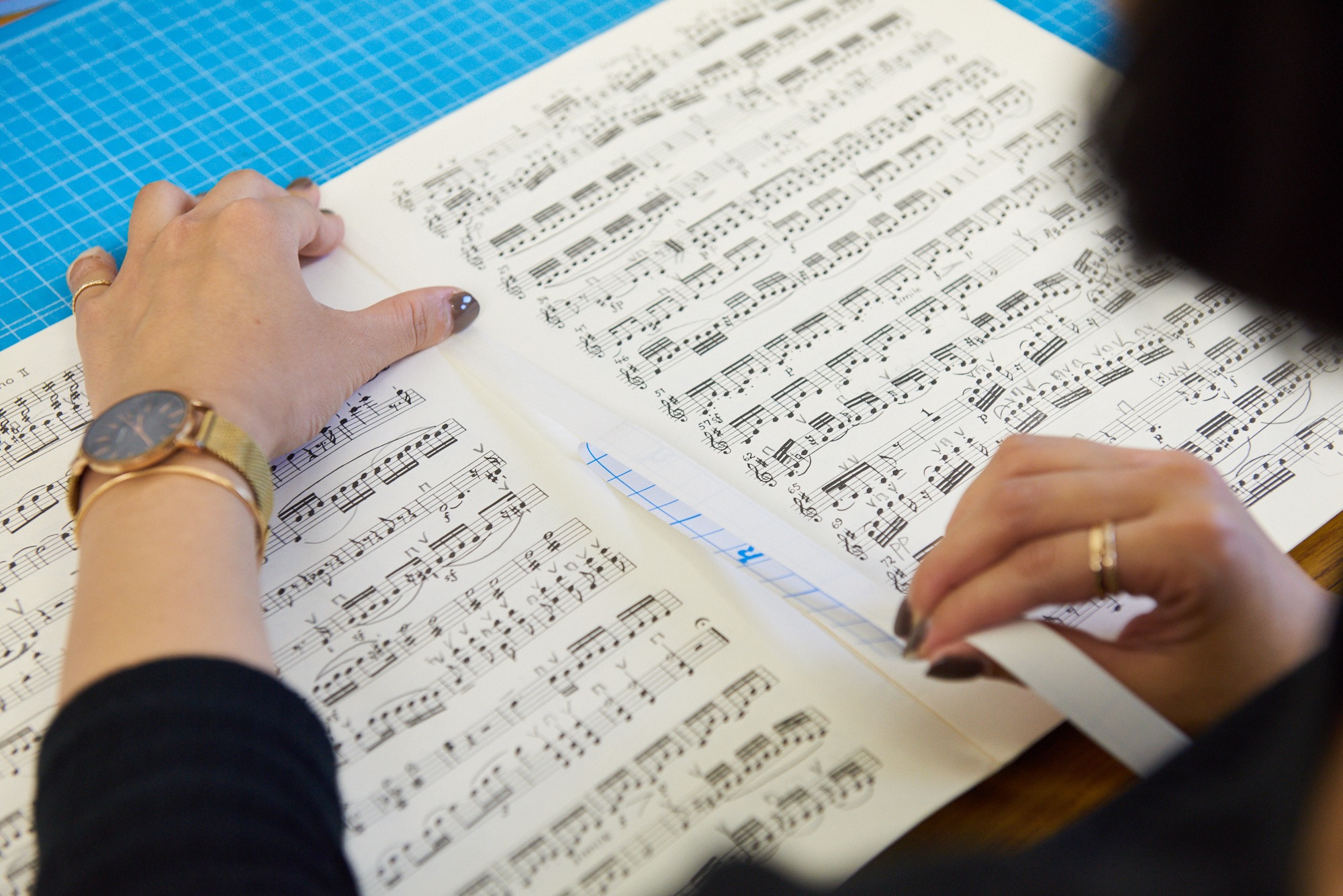
What does Yamaji think is the appeal of the Kanagawa Philharmonic?
As a fan, I'm looking forward to the fact that there are two concertmasters with different personalities. On top of that, they play a wide range of genres from classical to contemporary music and pop, so I never get bored even if I listen to them every day (laughs). I think that variety is the charm unique to the Kanagawa Philharmonic Orchestra, so I would love for everyone to listen to it.
Finally, we spoke with Public Relations Officer Koichi Taga, who arranged this interview.
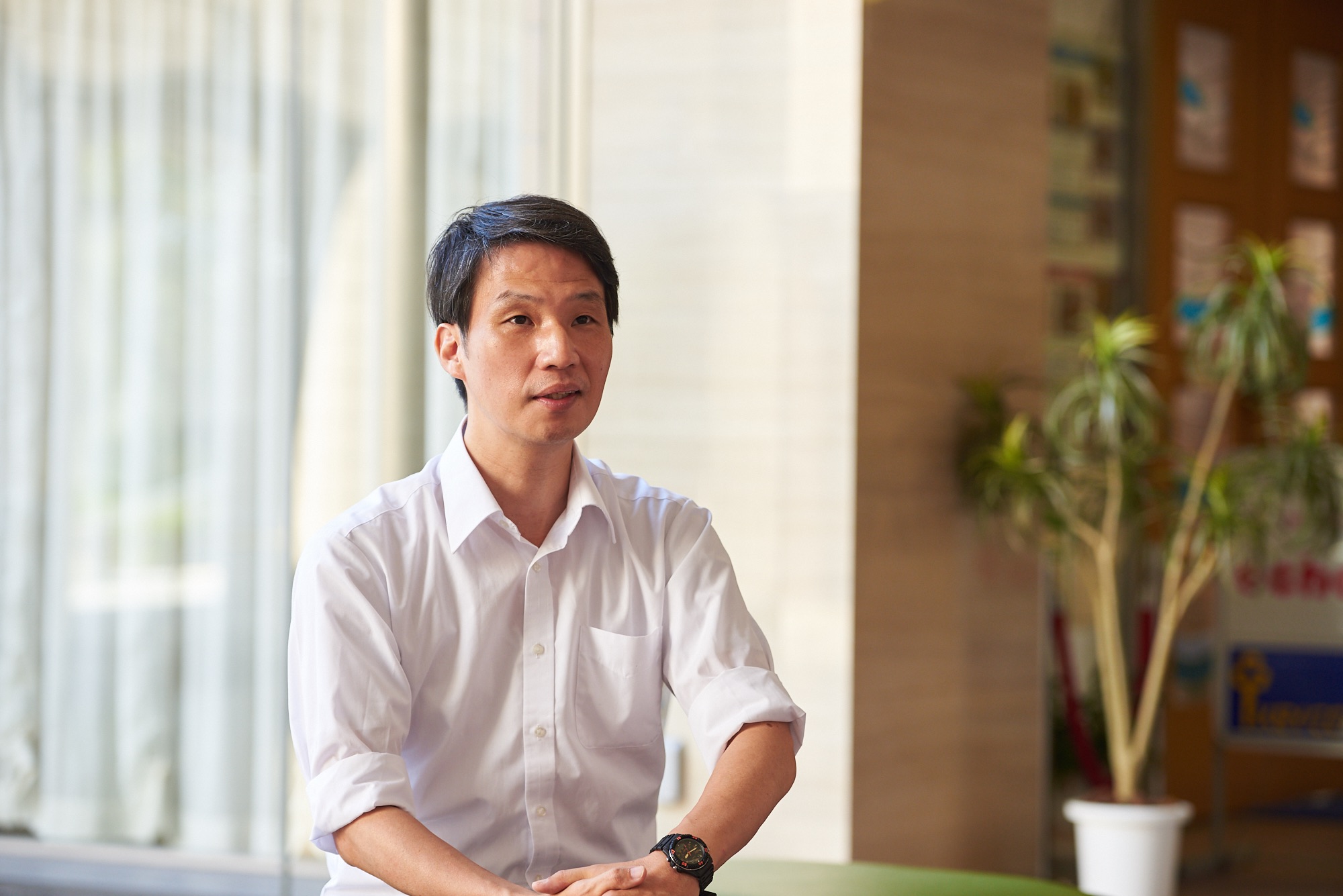
What kind of work is public relations?
First, once the concert program is decided, we create flyers and posters accordingly and distribute them in appropriate places, as well as carry out wide-ranging PR activities using the media. Another important task is to regularly send out information to various media outlets, including responding to interviews like today's, so that everyone can learn about the charms of the orchestra.
What's interesting about this job?
Although our job does not put us in the spotlight, we feel happy when we see the audience leaving with smiles on their faces after the show and saying "that was great." When we hold free concerts at shopping malls, people who don't usually listen to orchestras stop by and enjoy the music. When we see scenes like that, we feel truly glad that we chose this job.
In fact, there was a time when I was aiming to be a musician. If that dream didn't come true, I wondered if I should aim for a job supporting musicians, or look for a completely different path... After much trial and error, I found a job as a publicist for the Kanagawa Philharmonic Orchestra. Looking back, I think that the experience I gained from working in a non-musical field during that difficult time is still useful in my current job.

Do I need specialist knowledge of music?
I think it's good to have the minimum necessary knowledge, but it's not necessary to be a professionally trained person. What's important is love for the orchestra. As a business, you might think "it's enough to sell tickets," but when it comes to orchestra PR, I think the most important thing is to be able to convey your passion and love for music. It's true that even concerts that are created with great care can have performances that are "not so great" in terms of audience turnout. It's very unfortunate, but I feel happy to be able to share my passion for music with the orchestra members and the audience, and to share their joys, sorrows, and happiness.
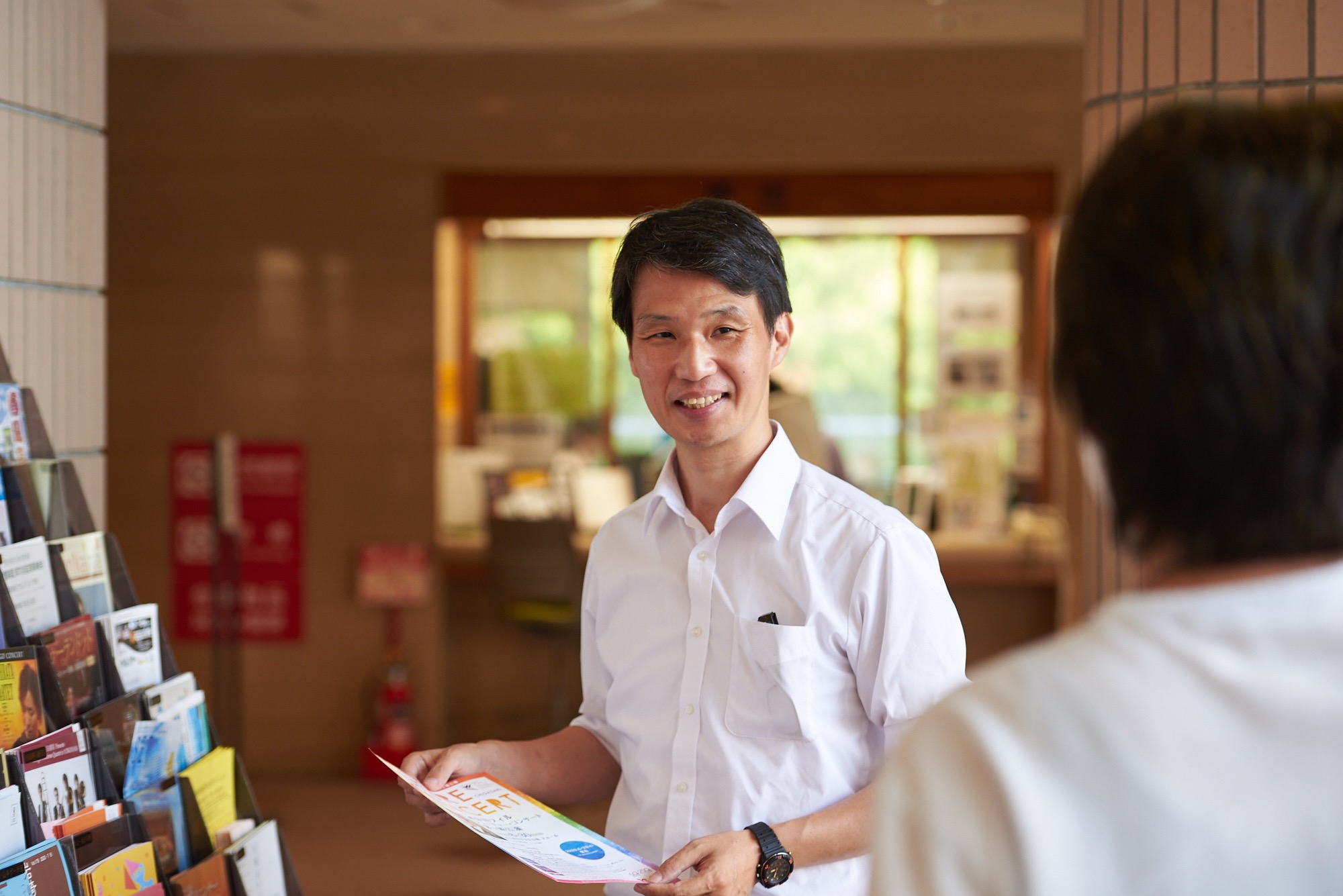
Please tell us about anything you would like to do or challenge in the future.
I want to connect more with the local community. I think we can do more with Yokohama F. Marinos and DeNA Baystars, and I want the companies in Kanagawa Prefecture to know more about the local orchestra. Personally, I want to connect with PR people from various industries, not just the music industry, share information, and get ideas to promote the Kanagawa Philharmonic Orchestra.
The Kanagawa Philharmonic celebrated its 50th anniversary this year. Unfortunately, many concerts and events have been canceled or postponed due to COVID-19 measures, but we hope to gradually resume them in the future while taking thorough preventive measures. I feel that the music produced by the Kanagawa Philharmonic has a hidden passion as its unique feature. Please come to a concert and experience live orchestral music.
* Click here for the Kanagawa Philharmonic Orchestra's official website !
*Kanagawa Philharmonic Orchestra has sent a concert invitation ticket to Magcal.net readers! Details are at the end of the page.
[What is Kanagawa Art Hall?]
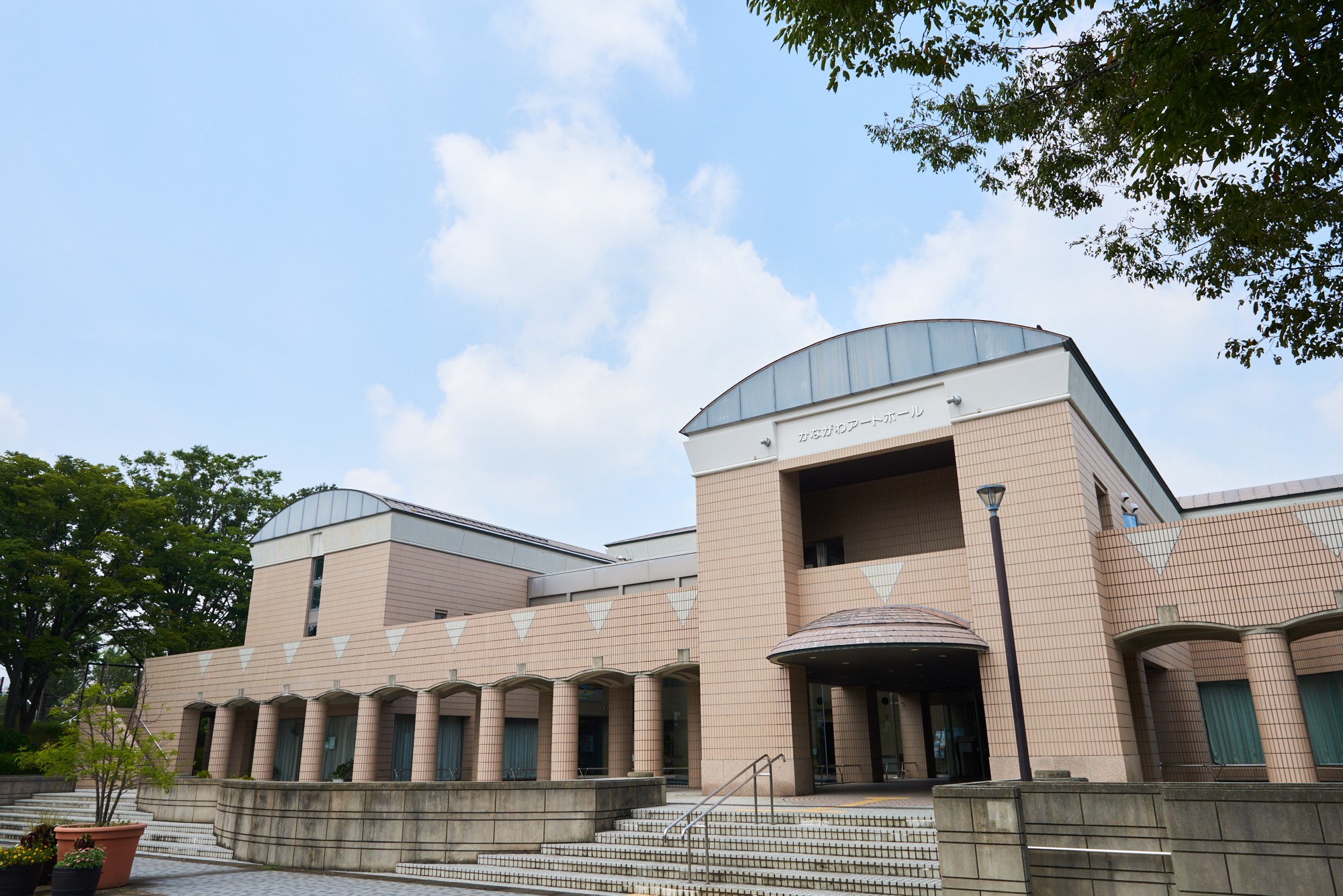
This music hall opened in 1992 in the prefectural Hodogaya Park in Hodogaya Ward, Yokohama City. In addition to the hall, it also has five studios, a restaurant, and an exhibition area. It was originally the headquarters of the Kanagawa Philharmonic Orchestra (now relocated to Naka Ward, Yokohama City), and is still used for rehearsals, which are sometimes open to the public (currently public rehearsals are suspended due to COVID-19 prevention measures).
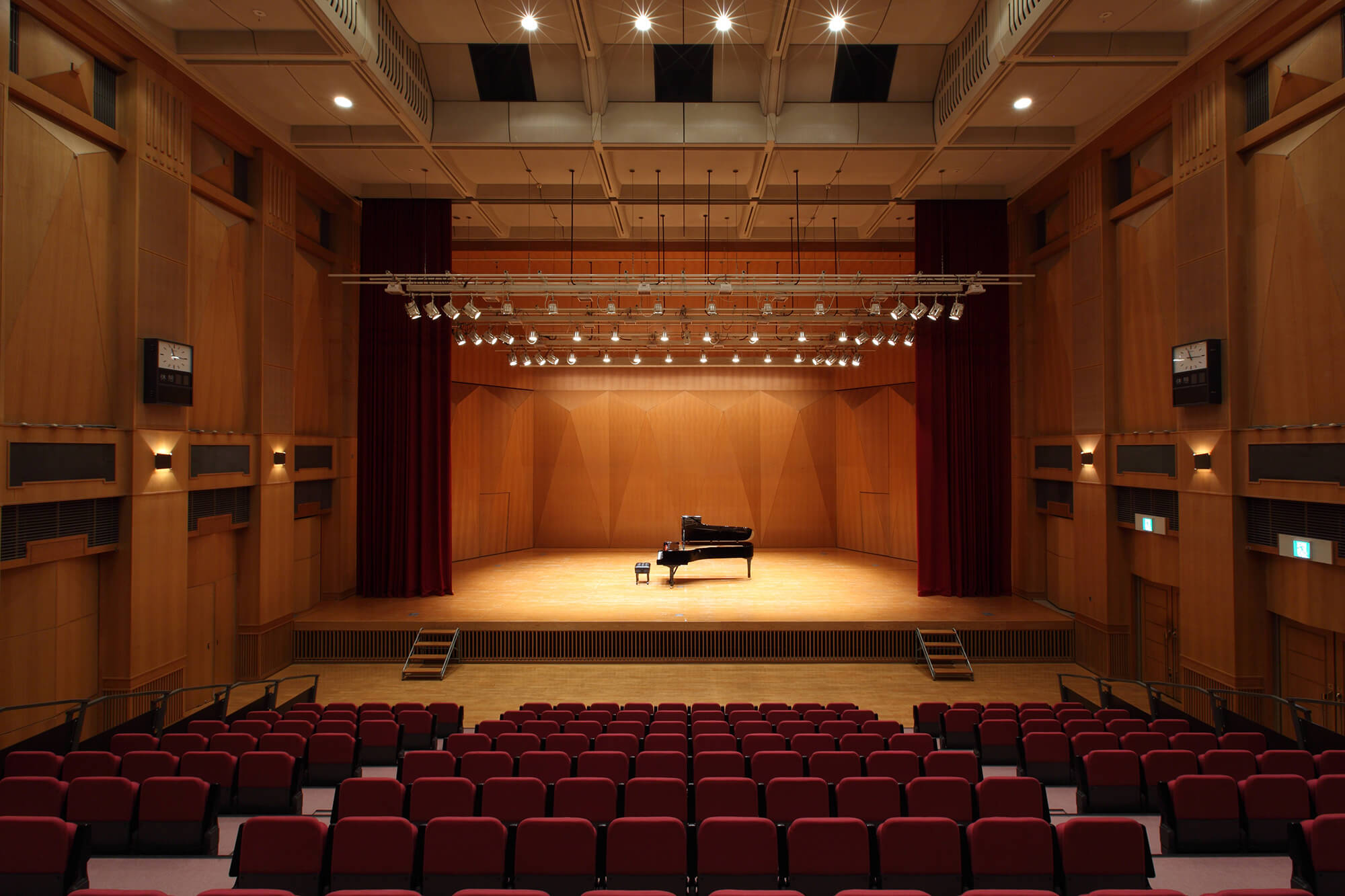
The hall can accommodate a maximum of 300 people. It is equipped with stage curtains and lighting, so it can be used for various recitals and concerts, as well as dance and theater performances.
In order to further promote the " Magcal Theater " initiative, Kanagawa Prefecture has launched the "Magcal Theater in Art Hall," with the Kanagawa Art Hall as the performance venue in addition to Studio HIKARI at the Prefectural Youth Center, which has been used up until now. Stay tuned!
The Kanagawa Philharmonic Orchestra has presented concert invitation tickets to Magcal.net readers!
[Kanagawa Philharmonic Concert in Ebina]
[Date and time] Wednesday, October 21, 2020, 19:00 start
[Venue] Ebina City Cultural Center Large Hall
[Conductor] Mirai Abe (conductor)
[Co-stars]
Airi Sunada (soprano)
Naoki Kawada (baritone)
Ebina City Opera Chorus (chorus)
[Main songs]
Glinka / Overture to the opera "Ruslan and Ludmila"
Donizetti / Benedette queste carte! from the opera "The Elixir of Love"
Donizetti / Come paride vezzoso from the opera "The Elixir of Love"
Bizet / "Toreador Song" from the opera "Carmen"
Lehar / "Vilja-lied Duet" from the comic opera "The Merry Widow"
Verdi / Va,pensiero from the opera "Nabucco"
Mascagni / "Gli aranci olezzano" from the opera "Cavalleria Rusticana"
Dvorak / Symphony No. 9 in E minor, Op. 95 "From the New World"
*Due to unavoidable circumstances, the performers, songs performed, etc. may be changed.
[Price] All seats reserved: ¥4,000 / Youth (under 25 years old): ¥2,000
[Inquiries] Kanagawa Philharmonic Ticket Service Tel. 045-226-5107 (Tuesday and Wednesday 10:00-13:00)
*Preschool children are not allowed to enter.
*Conductor Shigeo Genda, who was scheduled to appear in the tour sponsored performance "Future Concert Ebina Performance", is unable to appear due to circumstances. Miki Abe will be conducting instead. There are no changes to the program.
*************************************************************
The giveaway application period has now ended. Thank you to everyone who applied.
[Gift application details]
We will be giving away tickets to the Kanagawa Philharmonic Concert Ebina Performance, which will be held at the Ebina City Cultural Center Large Hall from 7:00 p.m. on Wednesday, October 21st, to three groups of six people.
[How to apply]
If you would like to receive a viewing ticket as a gift, please apply using the application form below. We look forward to receiving your application.
[Application Deadline]
Until 23:59 on Friday, October 2, 2020
[Lottery and Winner Announcement]
Winners will be notified by email, so please be careful of spam settings. The email will be sent by the Magcal.net Management Office (info.magcul@gmail.com).
The above email will serve as the winner notification instead of the announcement of the winner. On the day of the performance, please present the winning notification email at the reception desk of the venue, "Ebina City Cultural Center Large Hall". A staff member will hand you the ticket.
*Personal information provided will not be used for any purpose other than the lottery.

